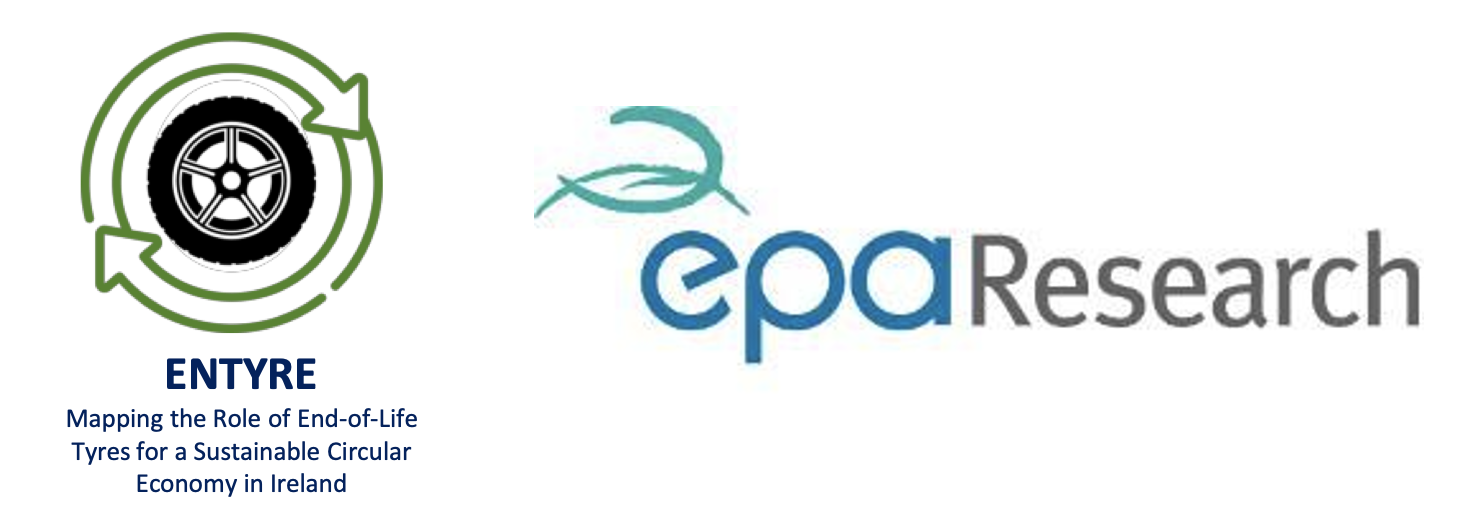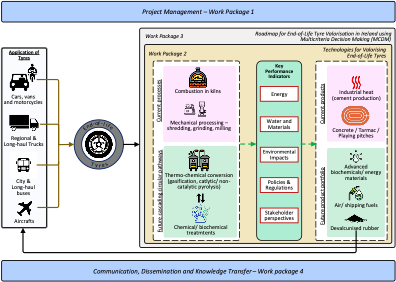
ENTYRE

- Title
-
Mapping the Role of End-of-Life Tyres for a Sustainable Circular Economy in Ireland (ENTYRE)
- Start Date
-
01st April 2024
- End Date
-
31st March 2025
- Funding Body
-
Environment Protection Agency (EPA), Ireland
- Coordinator
-
Dr Archishman Bose, Eli Lilly Lecturer in Process and Chemical Engineering, University College Cork (UCC), Ireland; Environmental Research Institute, UCC; Circular Economy, Energy and Environmental Systems (CEEES) Research group, MaREI, the SFI Centre for Energy, Climate and Marine.
- Co-Lead
-
Dr Gillian Collins and Dr Richard O’Shea
- Principal Investigators
-
Dr Archishman Bose, Dr Gillian Collins, Dr Richard O’Shea
- Research Area
-
Materials and Structures & Advanced Fuels in the Circular Economy
Introduction
Over 40,000 tonnes of waste tyres are collected in Ireland each year. In the past, these were sent to landfill, recycled as infill material for sports pitches, arenas, playgrounds etc., or exported to, predominantly Asian, countries where they were burned for fuel.
However, EU regulations have banned landfilling of tyres as they leach toxins into soils, provide breeding grounds for pests, and take up a significant amount of space. The microplastic ban states they cannot be used as infill going forward, and to create a circular economy, ban on exports outside the EU are being considered a well.
Therefore, it is vital Ireland relies on a new method of waste tyre management. This project will provide a comprehensive review of the various methods and technologies associated with waste tyre management, including energy recovery, civil engineering applications, and devulcanisation. After in-depth research and stakeholder consultation, a Multicriteria Decision Marking (MCDM) tool will rank the various options for End-of-Life tyres (ELT), outlining the most economically and environmentally sensible waste tyre management plan.
Aim
This project, Mapping the Role of End-of-Life Tyres for a Sustainable Circular Economy in Ireland (ENTYRE), is aimed at performing a deep review of existing practices and literature regarding utilisation pathways of waste ELT in terms of their techno-economic and environmental impacts as well as from the light of current and upcoming local (Irish) and international (EU) policies. In this regard, the aspect of reduction of microplastic pollution as highlighted in the REACH protocol, the focus on decarbonisation and achievement of a net-zero circular economy and reduction of imports to improve material security will be given priority. The project would also look at novel alternatives and recent developments regarding innovative conversion and management of ELTs including thermochemical, and biochemical routes of devulcanization of rubber [5]. Using a multicriteria decision making including industry perspective, the novel and the commercial technologies will be ranked against conventional processes to determine limitations, challenges and opportunities of novel technologies and the need for research, development, and support towards their commercialisation. Accordingly, in this project, ENTYRE, the end of life treatment of waste tyres will be studied in detail to identify both current trends and future opportunities to inform pathways of integrating their repurpose and reuse within the Irish circular economy while answering the following key unknowns (U).
U1: How would the current practices change under recent and upcoming policies (national and EU)
U2: What alternate treatments would be most suitable in the Irish context?
U3: How would alternate treatments contribute to the goals of decarbonisation and circular economy in Ireland?
Work Packages

Contact
BEng (JU), MSc (KTH, PoliTo) PhD (UCC)
Eli Lilly Lecturer, Process and Chemical Engineering,
School of Engineering and Architecture
University College Cork
College Road, Cork, T12 K8AF, Ireland
Affiliate PI, Environmental Research Institute
Circular Economy, Energy and Environmental Systems (CEEES) Research Group
MaREI Centre for Energy Climate and Marine
Dr Gillian Collins
Dr Soumitra Pati
Funding
This project is funded under the EPA Research Programme 2021-2030. The EPA Research Programme is a Government of Ireland initiative funded by the Department of the Environment, Climate and Communications.




